- Home
- Adam Thorpe
Hodd Page 18
Hodd Read online
Page 18
And no more stuffs were thrown, but the people waited patiently in the yard before the gates, trading and dealing and making sport among themselves; while all this time I also waited with Henry among the common folk, sore afraid, and saying he must return to his master forthwith. ‘Pshaw!’ he cried, each time: ‘I am merrier with you.’ We sat upon an old cask, and he jabbered of many silly matters (such as the theft of two geese from the abbey yard), as if he had not oped his mouth in a year.266
He glued himself to me so, that folk there might have thought he was my brother – unneth my own page, and not the monk’s. I wished him dead, in truth, for he also awoke in me a strange longing for the monastic house I had left so many months before, that was my only home; and e’en the smell of the sea-cave years before that, in which my first master dwelt, rose about me as the fragrance of roses in a garden.
I could not therefore prevent myself weeping behind my hands, for all seemed dark: which sight astonished Henrie. Placing his child’s hand yet tenderly on my nape, he bid me not to fret over my merchant-master’s archery, as all men would know that the city had been closed. I might have struck him – so hateful was it to be comforted by a mere piping imp, and so hardened was I by my outdoor felon life – if there had not been a great squeal of hinges at that moment, and the way made suddenly open.
I jumped down and darted between the many folk departing and entering, heedless of whether the golden boy was with me – indeed, I wished to shake him off, and thought I heard a high crying of my name behind me, that dwindled in the seething press of people I did thrust my path through, almost snapping the bow, until I burst there-out to freedom. The gates being shut two hours, the egress was like a deep ditch that is blocked and accumulates all sorts of annoyances and garbage and dung with a weight of water pressing upon it, and then is sudden released – wherein it flows much greater and more stinkingly than before, until the flood calms.
Upon the commons I made straight for the stables that lay anigh there, and took Hod’s horse (that was a swift, small-headed palfrey, but not his customary steed) behind my own on a halter rope I purchased from the groom, telling him that my pious master was residing in the priory for a month, and giving the boy a penny [extra]. This took time, as the saddles had to be set and the horses bridled and girthed, whereat golden-haired Henry appeared before the stable yard, puce-faced from running, with a look as the angels must have when they cast us away into the arms of the fiends of Hell – so furious and sad it appeared at the same time, that it made me almost cower. I was already mounted, and without thought I spurred my horse past him, Hodd’s palfrey following on the rope as best it might.
I near ran the angel-boy over in my haste – yet not once did I look back, despite his shrieking ‘Ho!’ at me. And soon I was upon the high road, going at a steady rack [citatus gradu].267 Sleeping that night in a grassy ditch, I reached the outlaw’s lair in the morning of the following day, as hungry as a lion; all the while seeing the wretched boy’s face looking up at me in piteous astonishment, yet horribly mingled with that of the damsel of the bluish-grey eyes, called Isabelle, so his features nestled in hers under the wimple!
I was so gladdened to be again under the great boughs, with all the little leaves trembling and fulsome with the spring, that I even forgot for a moment my grief and burden. Then the men cried, looking up from their tasks (or more often their idleness) in the wood-ways: ‘Here be the youth! What news, Muche?’ Which made me proud again, for they were eager, as though I were a knight returned from the Holy Land; while not even Flawnnes called me a filthy name.
And stopping my horse in the clearing under the giant oak where the felons would gather,268 I recounted to them what had happened, even before I had dismounted, my loins well chafed from the saddle.
Terrible were the wailings of the men, as I supped on venison broth and drank the seethed juice of birch,269 that lay on my tongue like the sodden leaves of the very tree itself – until it shook its crown in my brain, and was worse [in its effects] than ale. The outlaws wished to ride to the cursed town270 of Nottyngham immediately, but the hullabulloo brought out Littel John from Hod’s hut, which sore surprised me, for I thought him in Sherwode. But nay, he had doused his anger in riding hard over the moor, and poaching a fine stag from the king’s land (slaying it with a single shot): which beast’s head, crowned by huge antlers, he had mounted upon a pole by the rocks to scare away all intruding evil spirits – a most unhallowed and heathen act, that was to those very spirits as a stinking offal to flies.
Seeing Litel John come out thus from Hod’s hut, when no man was allowed in there save he be invited, I did wonder to myself how such a blasphemy could be tolerated: then I understood from Wil Scalelock, whispering in my ear, that Literl John was our captain from this moment, and all must obey him. ‘How can this be?’ I returned boldly (made reckless by the juice); for our new master was approaching the fire, and a veritable ogre he seemed to me in my weariness, having crowned himself with a chaplet of leaves that dandled about his ears.
‘Such was it decided between them before,’ said Will, ‘if our holy master Robbert should be taken; and if he be killed, then no man will be master, for all the chosen [spirits] will be free in his divine essence. For our true leader Robert is greater than God, that even his dust and shavings of hair will be precious relics.’ Yet God hath not hair, I should have said, for He is light eternal; but so deep was I in worthless heresy, that I merely assented with a nod.
Litel John commanded the men to cease their shouts and moans and mutterings, that made them like a rabble, or a gaggle of fish-wives, and after hearing from me [what had happened], he cursed the grey-eyed damsel and all womanhood, which was a blasphemy to the more devout of the heretics; for Hod had declared her to be his holy spouse, brought to him not by Fortune or even God but by the sea [of divine essence]. Yet none dared oppose Litel John, who was the strongest there, yet of no more brain (it was bruit among us) than a wine-tun.
Then he asked where was the monk from, who had so horribly betrayed our leader. And I trembled, for I did not want to tell him that I knew brother Thomas, nor that he was the monk they had robbed on the road when I was with him. This was a great error, for honesty might have allayed the suspicion that I was involved in the treachery by sleight.
Yet John was a vengeful man, and must have a tooth for a tooth; a devil crawled into my mouth and manipulated my tongue. I was a mere ignoble youth and full of pride, swelling e’en more when I saw the men all gape upon me for the answer, and my brain still moistered by the strong drink.
And so I said, ‘He is of that hateful abbey that hath this very wood in lease.’ And the men all cried out its name, and swore, for they cursed the holy house of St Edmund’s of Dancaster, that wished to cut their trees for the making of their glass, as barley or oats are cut by the sickle to make bread. ‘When does he return?’ asked John; and I felt moistness in my mouth, which was bitter, for no doubt a demon was pricking my spleen with each hesitation. And this made me utter the truthful answer, which (as I had learned from Henrie) was upon this very day of Saturday: the journey to be made without a night’s rest.271
‘Then he will be returning there by the highway,’ the felons cried, ‘mayhap it’s not too late!’ Litl John hushed them with a roar, and said he must meet this tree-lopping Judas Iscariot alone, and prise from him what intelligence he could; before [avenging] our master Robrerrt [sic] in the right way, with a cut throat.
‘You must accompany me, Moch the little minstrel,’ he added, ‘for only you might tell me how the villain appeareth, even in disguise.’ I could not reply that he would recognise me, as his former pupil, for none present knew this. Instead I said: ‘Happily will I do this, save he might know me from the church, as I talked well to his little page.’ And John scoffed, saying, ‘Didst thou tell the little page thou wast Robbert Hod’s [page]?’ ‘Nay,’ I answered, ‘yet he is a crafty boy, and I left him too hastily on witnessing the capture.’ ‘Cease thy l
ambish fears,’ said Litell John, ‘for we too will be returning from that cursed Notynggam, and you shall be disguised! And even I shall be dressed as a merchant, playing thy father, for our fame begins to spread.’272
I felt borne upon a strong current, too weary to resist, alas, like an otter [lutra?]273 that hath been winded by the hunt. And the others complained, saying why should they tarry in the wood, while their master was rotting in the stench of a cell, enduring tortures? And Flawnes of the thin face cried, standing upon a fallen bough and waving his horrible knife like a claw: ‘Let us break down the door of the prison, all fifty of us well armed, having stolen into the city in disguise, and after laying hands upon the sheryf and his men, and striping them into ribbons, rescue our true master!’ But Little John said he had received a vision in the master’s hut, that place being called the Schyninge Tempel: for within it the obscure was revealed – namely, the future way – as if by a great light. Yet rather should it have been called (say I now) the Temple of the Nail [clavis], for no more than a nail was it worth.274
My disguise was that of a modest girl in a maidenly pelisse, with my face whitened by lye behind a fine veil, for I was feigning sickness of a mild ague and the air must not mingle with my breath. And the master forger, he whose fingertips had been shaved by glass to the bone, did practise his skills upon me as if I were a document, and the touch of him was cold and very horrible. And lest Litell John was known to the monk (which indeed he was, from the robbery), or e’en by repute, the forger crushed certain berries; drawing out the juice therefrom, he rubbed it into the skin of my companion, which made the skin swell and redden like a corpulent fellow’s for many hours, as the juice of fresh walnuts make a man seem leprous. And Litel John was truly now the plump merchant, for a cushion was tied upon his stomach, under the shirt.
Also, the forger gave false papers to Litl Johne, changing words and names on that which had been stolen; for verily the outlaws’ camp had a great number of these [stolen documents]. This matchless villain could e’en forge a royal seal in wax! Thus nimbly does the Devil work, throwing all into disorder and turmoil.275
Then the felons laughed as I rode out, for I was truly like a maiden and of great beauty behind the veil, that rubbed out my boyishness like a strigil doth graze ink, yet keepeth the shadow of it. The loudest was Fawnes, calling me unnatural names – who, being struck with great force of fist by Li[t]erl John as he passed him, fell bleating upon the forest earth, his thin face seeming cracked like a dish.
We passed at a gallop over the wild heath to the road, and joined it at a good gait until we saw [the forest of] Sherwod some hours later, this forest being much coppiced and lopped; yet we had not crossed my old master, to my great relief. As we passed alongside the great fresh-leaved boughs and the motley darkness beyond them, Litl Johnn (being guised as a gold-hewn merchant, and I his gent daughter) feared being despoiled in turn, which caused us much mirth; at that time, however, Sherwode was not the most dangerous place for robbery, for many who hid within it, fleeing justice or others’ vengeance, were not cut-throats.
The highway entered the forest, and lest men lose the track among the sturdy trunks and boughs, knots had been tied about the branches, and ribbons slung here and there as signs, as is the usual way; but when we came to a place where three ways met in a clearing, John laughed of a sudden and did not take the marked way, but turned left along a broad and grassy stretch that was more sunken. I pointed to the way of ribbons and knots, but he said that filthy robbers had changed them, that men might be lured into their trap, and deceived in the heart of the wild and leafy waste to the cost of their goods and even life. I too laughed, and hoped privately that our quarry had been thus lured, so that we would not have to meet them.
A mile or two further on, where the desolate mass of trees were broken on one side by fields and pasture, we waited just as demons wait for folk to be tempted, and ransack their souls in this world of thronging [pressus].276 And Moch, waiting in these ambushes [in insidiis erat], was therefore a fiend himself, ready with his hook.277
4
Yet the iron bonds are of my own making, and my master is the Lord God Himself.
Indeed, in these fallen days, clerks and scriveners form their letters better than my holy brothers, whose days are too full of idleness and vanity, save it be to brew intoxicating liquors – for they are mostly young, and soft as well-boiled fish in our fresh century. I am more wrinkled than any page in this fat volume,278 and as scabbed o’er and blemished as many a fine book in our library, in which youths have done their worst.
Yet it is life itself that hath mutilated me, as if I have been too much read or fallen into greasy hands, as so many of our precious books are marked in their favoured places by toothpicks and straws; and worms breeding in their pages as they breed in my own cheek teeth, and paining me so with their gnawing and digging (which neither prayer nor myrrh, nor hot mutton-fat, did ever relieve), that scarce one tooth remains in my jaw’s binding.
As we awaited brother Thomas and Henri upon the track, as wolves await their helpless prey, memories came unbidden of my earlier years, so that at times in my great weariness, and all but slumbering in the saddle, I pictured the hermit and Edwine approaching us, and not our true quarry. My greatest sin up to that time was the stealing of the harp, for the harp was my first master’s; and in seizing it I cast myself from him, to end in the thorny thickets of the fallen world wherein I was now caught fast.
Alas! that loved ones waxen dull and old, and felled are the favourite places, yet a man’s sins remain as ripe as a new-picked apple! For with these sins come the memories as fresh as a fragrance of the fruit, and so did I remember then, waiting on that wood-way, how I first slipped upon the ladder, and plunged from the Lord to this mortal risk to my soul. Yet what recks me, so long after, that I was on the verge of such a calamity – but that these words glisten in my head and bid me set them down?
So it was under the wood-weft that I saw again in my mind how, after playing and singing to the courtiers that dreadful day, gaining in that act what to my miserable condition was a veritable treasure, I hid this windfall [forte oblatum], amounting to over 10s, in an old cracked pot in a secret place near my home, this being in a corner of an overgrown meadow.279
Lo, under Sherwode’s tree-weft did I watch myself returning to the cliff that former evening with the harp, and the hermit (being long woken from his trance of prayer), gathering glaswort from the foot of the rocks.
I heard again my child’s voice, telling him how I had sung holy songs to the royal throng, that they might mend their ways: ‘And I secretly took the instrument from the cave, my master, for fear of disturbing you.’ I heard again how urgently he bid me play to him, instead of berating me, explaining it thus: ‘Baffled demons attacked me while I was at prayer, throwing gold that instantly turned to boils and blains on my flesh, martyred already with sores, for the sea air salts my skin as it does that of a fish.’ Though no boils were visible, yet they hurt him like fire, and thus the Prince of Fiends sends us innumerable torments that bear no visible signs.
How glad I was in my child’s heart, not to be scolded or beaten: yet far better would it have been for my Christian soul if I had been lashed like the harlot, even at nine or ten. The demon’s worm settled comfortably within my brain, on that day, ready to burst forth like a moth in the darkness; and I did not see how the hermit’s dream was a warning to me, for filthy lucre is Hell’s gain in this our modern [moderno] age.
‘In the bowels of Jesus Christ,’ said then my first and holiest master, ‘we long for home, that is the Kingdom of God. Arise, work, and pray: that is all we need to know upon this vile earth, that is scabbed o’er with suffering. Yet we must not hasten there too swiftly, but trust in the Lord to deliver us, and not through our own hands.’
By this he meant that the demons had tempted him to end his days: this being a heinous sin, but a common temptation to martyrs of the flesh. I saw how red and swollen were
his eyes from weeping, and I began to sing again in my clearest voice, telling of the purest damsel that is loved by a knight, who serves her in battle and suffers pains, that only this devout maiden’s presence can heal with her own warm hands, for she is none other than the spotless Virgin. And another I sang, of a devout lady betrothed to a dreadful and bloody baron; and yet she spoke secretly to her secret spouse every night in her bed-chamber, who shared her pillow and comforted her so that she felt a trembling ecstasy in her entire body, from head to toe; this spouse being (in reality) Jesus Christ, to whom she had sworn her eternal troth.
And the sun setting upon the sea (the darkness gathering its cloak about us), a light wind caressed our faces as we sat upon the sand and I plucked and sang. Between songs my master the hermit did say how the beauty spread before us was a temporal mirror of God’s eternal beauty, just as the singing of such sweet lays (and not the profane howling of buffoons in taverns or suchlike) was an echo of the angelic harmonies of Heaven, and not at all worldly. And the song of the lady of the lovely shape, clean and fair and dainty – she that in maytime doth walk in the meadow with a coronet of flowers that she hath plucked in the company of another, though many times hath she visited the poet in a vision, bidding him sleep in his restlessness with a chaste kiss of her mouth upon his lips, for she is the most merciful and Holy Queen herself, the Mother of God – he did accompany with his deep voice, in a kind of murmuring moan, that was exceedingly sad and beautiful, and all the coin thrown was of the glitter of the last rays upon the sea.
All this I lived again in the thicket by the wood-way, waiting under that leafy vault for my final transgression. Yet it did not spur me to flee, bound as I was upon the wheel [of Fate].

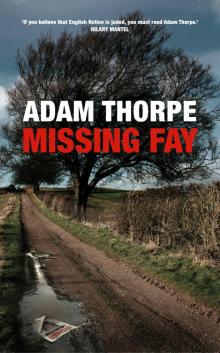 Missing Fay
Missing Fay Hodd
Hodd Pieces of Light
Pieces of Light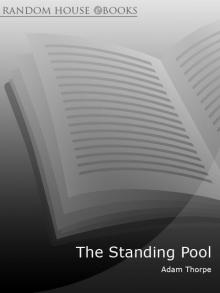 The Standing Pool
The Standing Pool Ulverton
Ulverton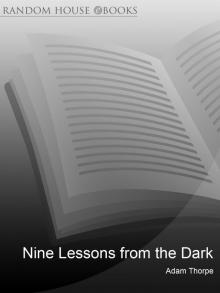 Nine Lessons From the Dark
Nine Lessons From the Dark Flight
Flight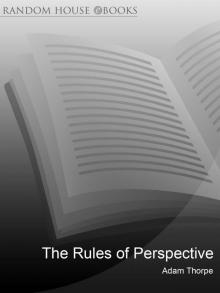 The Rules of Perspective
The Rules of Perspective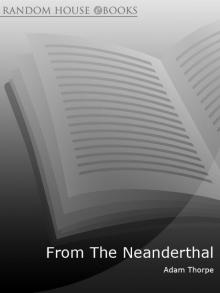 From the Neanderthal
From the Neanderthal Is This the Way You Said?
Is This the Way You Said?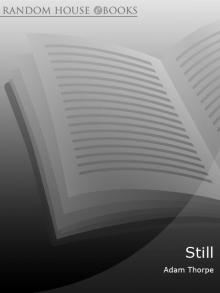 Still
Still No Telling
No Telling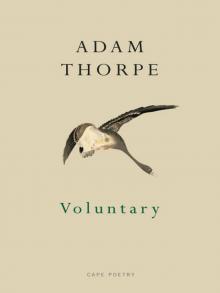 Voluntary
Voluntary Between Each Breath
Between Each Breath